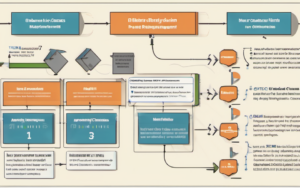In today’s globalized marketplace, where goods traverse continents and intricate networks of suppliers, ensuring supply chain security is paramount. Blockchain Supply Chain technology has emerged as a transformative force, revolutionizing the way businesses manage and secure their supply chains. This innovative approach utilizes a decentralized and transparent ledger to track goods, transactions, and data, offering unparalleled levels of security, visibility, and efficiency.
The Importance of Supply Chain Security
A secure supply chain is essential for businesses to maintain their reputation, protect their brand, and ensure customer satisfaction. Breaches in supply chain security can result in product counterfeiting, adulteration, delays, and even safety risks. These disruptions can lead to significant financial losses, damage to brand image, and legal consequences.
Challenges in Traditional Supply Chains
Traditional supply chains often rely on paper-based records and manual processes, making them vulnerable to errors, fraud, and tampering. Lack of real-time visibility into the supply chain can make it difficult to track goods, identify issues, and respond quickly to disruptions. Furthermore, the fragmented nature of supply chains, with multiple stakeholders involved, can hinder collaboration and communication.
Blockchain: A Game-Changer for Supply Chain Transparency
Blockchain technology addresses these challenges by providing a secure, transparent, and immutable record of all supply chain activities. Its decentralized nature eliminates the need for a central authority, ensuring that data is tamper-proof and readily accessible to all authorized parties. This transparency fosters trust and accountability among stakeholders, leading to more efficient and reliable supply chains.
Understanding Blockchain Technology
At its core, blockchain is a decentralized ledger technology, meaning that data is distributed across multiple computers, rather than being stored in a single location. This distributed nature makes the blockchain highly resilient to attacks and manipulation.
Decentralized Ledger Technology
Each block in the blockchain contains a record of transactions, and these blocks are linked together in a chronological chain. Every time a new transaction occurs, it is added to a new block, which is then verified and added to the existing chain. This process ensures that the blockchain is constantly updated and that all participants have access to the same, immutable record.
Immutability and Transparency
One of the key features of blockchain is its immutability. Once a transaction is added to the blockchain, it cannot be altered or deleted. This makes it an extremely reliable and trustworthy system for tracking and verifying data. Furthermore, the transparent nature of the blockchain allows all participants to view the history of transactions, providing complete visibility into the supply chain.
Smart Contracts: Automating Supply Chain Processes
Smart contracts are self-executing agreements that are written into the blockchain code. They automate specific tasks and processes, such as payments, inspections, and inventory updates. By eliminating the need for manual intervention, smart contracts streamline operations, reduce errors, and enhance efficiency.
Benefits of Blockchain for Supply Chain Management
The adoption of blockchain technology brings a multitude of benefits to supply chain management, including:
Enhanced Transparency and Traceability
Blockchain provides a complete and auditable record of all supply chain activities, from raw materials sourcing to final delivery. This enhanced transparency enables businesses to track goods with precision, ensuring their authenticity and origin. By leveraging blockchain, companies can build trust with customers, suppliers, and other stakeholders, demonstrating their commitment to ethical and sustainable practices.
Improved Security and Fraud Prevention
The immutability and transparency of blockchain technology make it virtually impossible to alter or tamper with data. This significantly reduces the risk of fraud, counterfeiting, and other security threats. By eliminating the need for intermediaries, blockchain also minimizes the potential for human error and malicious activity.
Streamlined Operations and Reduced Costs
Blockchain automation through smart contracts streamlines processes, reducing manual tasks and eliminating paperwork. This results in increased efficiency, faster transaction times, and significant cost savings. By providing real-time data, blockchain also allows businesses to optimize inventory levels, reduce waste, and minimize delays.
Increased Efficiency and Collaboration
The shared, transparent ledger in blockchain facilitates seamless collaboration among all supply chain participants. Businesses can easily share data and track progress, improving communication and coordination. This leads to more efficient operations, faster delivery times, and better overall supply chain performance.
Practical Applications of Blockchain in Supply Chains
The potential applications of blockchain in supply chain management are vast and diverse. Here are some key areas where this transformative technology is making a significant impact:
Product Origin Verification
Blockchain can be used to track the origin of products, ensuring their authenticity and provenance. This is particularly crucial for industries such as food, pharmaceuticals, and luxury goods, where counterfeiting is a major concern. By tracing products back to their source, businesses can provide customers with assurance of quality and prevent the sale of counterfeit goods.
Inventory Management and Tracking
Blockchain can be used to track inventory levels, movement, and location in real time. This eliminates the need for manual inventory counts and provides accurate data for demand forecasting, warehouse management, and logistics optimization. By leveraging blockchain, businesses can reduce stockouts, improve inventory turnover, and minimize storage costs.
Supply Chain Financing
Blockchain can streamline supply chain financing by providing secure and transparent records of transactions. This enables businesses to obtain faster and more efficient financing, improving cash flow and reducing operational costs. Blockchain also facilitates the use of trade finance instruments, such as letters of credit, which are crucial for international trade.
Quality Control and Compliance
Blockchain can be used to track product quality and compliance with regulatory standards. By recording inspection data, test results, and other relevant information on the blockchain, businesses can ensure product safety and meet industry regulations. This also allows for efficient recall management, minimizing the impact of product defects on customers and the brand.
Case Studies: Real-World Examples of Blockchain in Action
Several companies are already leveraging blockchain technology to transform their supply chains. Here are some notable examples:
Walmart’s Food Safety Initiative
Walmart has implemented a blockchain-based system to track the origin and movement of food products, improving food safety and traceability. The system allows Walmart to identify the source of contaminated products quickly, minimizing the impact of foodborne illnesses.
IBM’s TradeLens Platform
IBM has developed a blockchain-based platform called TradeLens, which facilitates collaboration and data sharing among participants in the global shipping industry. TradeLens enables businesses to track shipments, manage documents, and improve efficiency in international trade.
Maersk’s Blockchain-Based Shipping Solution
Maersk, a global shipping giant, has implemented a blockchain-based solution to streamline shipping processes. The platform allows for real-time tracking of containers, automated documentation, and enhanced transparency in the supply chain.
Challenges and Considerations
While blockchain offers significant advantages for supply chain management, there are some challenges and considerations that businesses need to address:
Scalability and Performance
As the number of transactions on a blockchain increases, scalability becomes a concern. Ensuring that the blockchain can handle high volumes of transactions without compromising performance is crucial for widespread adoption.
Interoperability and Standardization
For blockchain to be truly transformative, different blockchain networks need to be able to communicate and share data seamlessly. Developing industry standards and promoting interoperability are essential for fostering a connected and efficient blockchain ecosystem.
Regulatory Landscape and Compliance
The regulatory landscape surrounding blockchain technology is still evolving. Businesses need to ensure that their blockchain solutions comply with relevant regulations and standards. Collaboration with regulators and industry bodies is crucial for navigating this complex regulatory environment.
The Future of Blockchain in Supply Chain Management
The future of blockchain in supply chain management is bright, with numerous emerging trends and innovations poised to further revolutionize the industry.
Emerging Trends and Innovations
The integration of artificial intelligence (AI) and machine learning (ML) with blockchain is enhancing supply chain visibility and predictive analytics. The development of new blockchain platforms optimized for specific industries, such as healthcare and pharmaceuticals, is also driving adoption.
Potential Impact on Businesses and Consumers
Blockchain is expected to have a profound impact on both businesses and consumers. For businesses, it offers increased efficiency, cost savings, and enhanced security. Consumers will benefit from greater transparency, traceability, and assurance of product quality.
Conclusion: A Secure and Transparent Future for Supply Chains
Blockchain technology is poised to reshape the global supply chain landscape, ushering in a new era of transparency, security, and efficiency. By embracing this transformative technology, businesses can build resilient and sustainable supply chains, enhancing their competitiveness and building trust with customers and stakeholders. The future of supply chain management is secure, transparent, and powered by blockchain.




